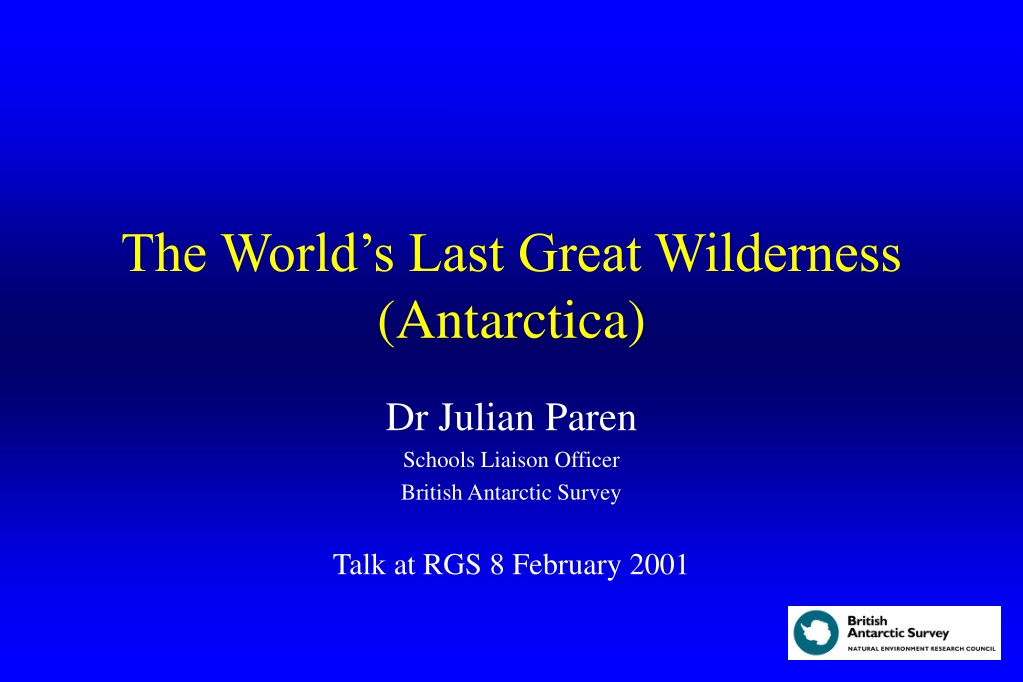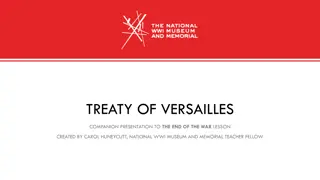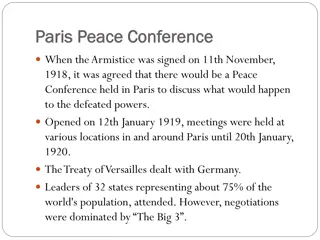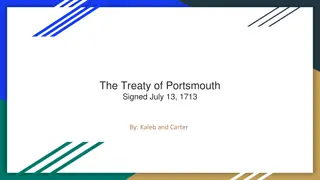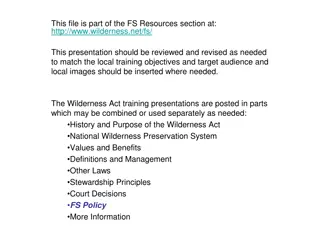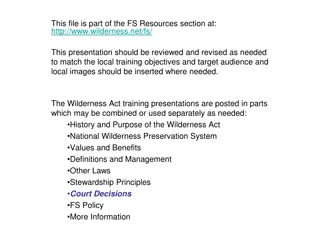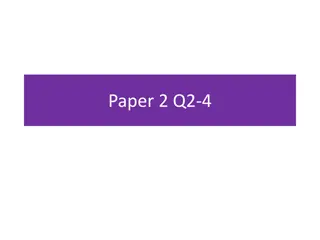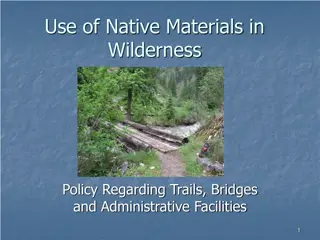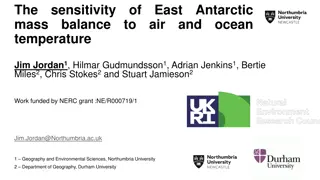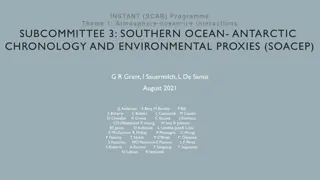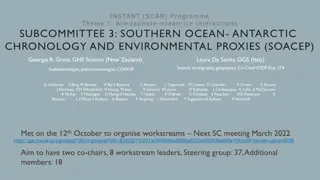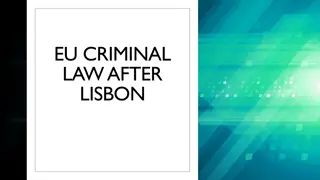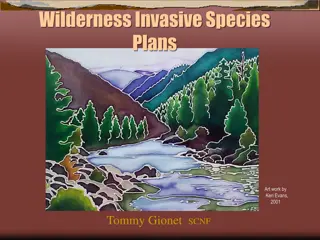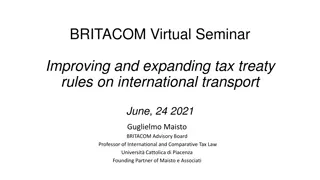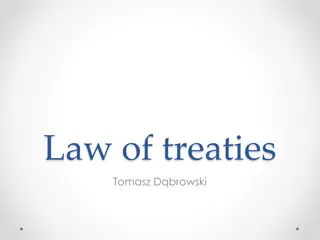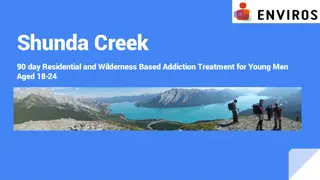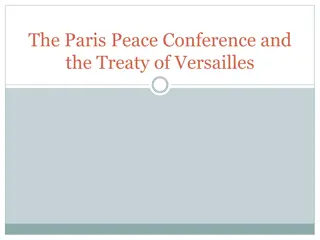The Last Great Wilderness: Antarctica and the Antarctic Treaty
Antarctica, the world's most remote continent, is home to a unique environment and diverse wildlife. Managed under the Antarctic Treaty, which prohibits mining and promotes peace and scientific research, this region faces environmental challenges despite being rigorously protected. Misconceptions about Antarctica persist, but the reality is that it remains largely untouched by human activities, with pollution primarily entering through the atmosphere.
Download Presentation

Please find below an Image/Link to download the presentation.
The content on the website is provided AS IS for your information and personal use only. It may not be sold, licensed, or shared on other websites without obtaining consent from the author. Download presentation by click this link. If you encounter any issues during the download, it is possible that the publisher has removed the file from their server.
E N D
Presentation Transcript
The Worlds Last Great Wilderness (Antarctica) Dr Julian Paren Schools Liaison Officer British Antarctic Survey Talk at RGS 8 February 2001
The Antarctic continent Coldest, driest, windiest, highest, and least accessible continent Winter population 1000 people, 10,000 in summer 10,000 tourists visit for a few days in summer Ice covered for the last 25 million years Less than 1% of continent is ice free Once the home of dinosaurs, trees and plants An insect is the lion of the Antarctic
The Southern Ocean Fifty million seals & 15 million penguins Regional fishery of global economic value History of over-exploitation. Seals, whales. penguins and fish Fishery for krill and fish regulated by science-backed international body under Antarctic Treaty Pirate fishing due to lack of effective policing Decline of albatross due to mortality on long lines of tuna fishermen in sub-Tropics
The Antarctic Treaty Antarctica is a natural reserve devoted to peace and science The Antarctic Treaty manages the region s wildlife Mining is forbidden The Treaty runs indefinitely Forty-four countries have acceded to the Antarctic Treaty (80% of the world population) All 44 countries have to agree to Treaty revisions
Green fallacies about the Antarctic The Antarctic Treaty expires in 50 years Mining is only banned for 50 years Antarctica is under threat from developers People working in the Antarctic have polluted the continent Antarctica still has to be saved Penguins fall over backwards when planes fly overhead!
Home truths from the Antarctic The Antarctic is the most rigorously protected region of the world The protection is legally backed International inspection teams monitor compliance with the Antarctic Treaty Man s footprint on Antarctica is practically invisible More pollution enters the region through the atmosphere than is generated there (DDT, CFCs )
Antarctic discoveries The destruction of the ozone layer A 400,000 year demonstration of the link between greenhouse gases and climate The global impact of the Industrial Revolution A reduction of the height of the ionosphere consistent with global warming Lakes beneath the Antarctic ice sheet believed to contain life forms possibly millions of years old
Antarctica is part of the world The Earth system involves the whole Earth Antarctic studies are essential There can be no weak link in understanding the Earth system Climate feedbacks involving ice, snow, sea ice and ocean currents provide the greatest challenges in predicting the future
The Arctic Contains cities, towns and universities Indigenous population share the region with new settlers All Arctic land is under the jurisdiction of a sovereign state UK scientists regularly work in the Arctic There is far more science activity in the Arctic compared to the Antarctic
The Antarctic ice sheet Ice up to three miles (4500 m) thick Coldest surface temperature -89 degrees C Enough ice for each person in the world to have a block 180 m by 180 m by 180 m If all melted, sea level could rise 65 metres If all the glaciers doubled their speed of flow it would take 12,000 years for the ice to float into the Southern Ocean
Antarctic ice and sea level rise A small change in the size of the Antarctic ice sheet would be serious for sea level One small part of Antarctica is above freezing in the summer - the Antarctic Peninsula. The Antarctic Peninsula is warming and its coastline is changing Maps of Antarctica need updating regularly because of the changes to the coastline The disintegration of ice shelves from the Antarctic Peninsula has had no effect on sea level Most of Antarctica is not warming In a warmer world more snow will fall over the Antarctic Enhanced Antarctic snowfall is possibly the only natural way that sea level rise can be slowed
Future developments in Antarctica Exploring the largest lake under the ice sheet Obtaining a reliable climate record over half a million years Exploiting natural antifreeze in Antarctic organisms Studying the effects of increased UV-radiation and global warming on Antarctic life Celebrating the centenaries of the historic expeditions of Scott, Shackleton and Bruce
Antarctic Schools Pack Fifteen sections : each with worksheet and tasks and resources for multiple photocopying Teachers notes Sent free to every UK secondary school Aimed at A-level standard Written by British Antarctic Survey scientists and an educational advisor Published by the Foreign and Commonwealth Office
Antarctic Schools Pack The nature of Antarctica Discovery of Antarctica Living and working in Antarctica Science in Antarctica The Antarctic Treaty System Geology in Antarctica Antarctic ice The Antarctic climate The ozone hole Geospace Terrestrial and freshwater lake ecosystems Marine ecosystems Management and conservation of marine species Environmental protection of Antarctica Tourism in Antarctica
Feedback on Antarctic Schools Pack An essential resource for school or college Packed with a variety of up-to-date and relevant information that can be used flexibly in the classroom Mori poll voted it one of the best four resources available for study of environmental change Received Gold Award of Geographical Association in Spring 2000
Future teaching resources on Antarctica BAS has signed a partnership agreement with the Geographical Association First priority is to develop a Work Package at GCSE level on Antarctica Propose to develop materials for Primary Schools BAS welcomes feedback on the Schools Pack BAS will develop www.antarctica.ac.uk
Resources on the web www.antarctica ac.uk (British Antarctic Survey) www.asoc.org (The Antarctica Project) www.antarctic.com.au (Antarctic Adventure) www.aad.gov.au/goingsouth/tourism/news (tourism) http://files.fco.gov.uk/info/briefs/antarctic.pdf (Britain and Antarctica briefing document) news.bbc.co.uk (search for Antarctic )
This powerpoint was kindly donated to www.worldofteaching.com http://www.worldofteaching.com is home to over a thousand powerpoints submitted by teachers. This is a completely free site and requires no registration. Please visit and I hope it will help in your teaching.
